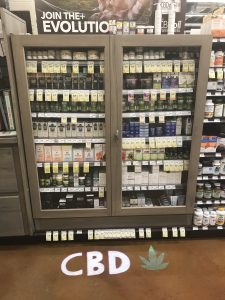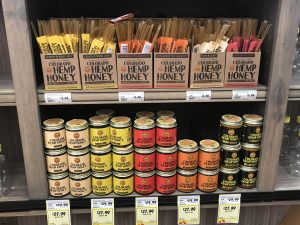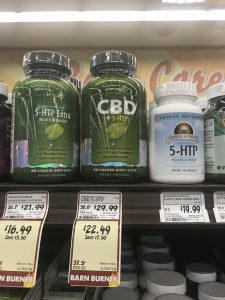CBD – Cure or Conspiracy?
Amna Yaqub
When I told my friends that I was interested in learning more about cannabidiol (CBD), they eagerly shared their own experiences of CBD use with me. One friend uses it as a tincture to help her sleep; another uses CBD lotion to help with her eczema. Some of them expressed interest in trying CBD to help alleviate stress and anxiety, and a woman told me how her aunt uses it to treat foot pain from diabetes complications while I was looking at CBD products at a grocery store. There always seems to be a new product or program that can help us lose weight, build muscle, feel more energetic, or even help us sleep better, and right now, that product is CBD. CBD has emerged in the past couple years as a popular method to combat a variety of health issues and improve overall wellbeing. CBD sales in the United States are now estimated to exceed $200 million, and this number is quickly growing (Cohen & Sharfstein, 2019). While often sold as an oil, CBD has lately started to infiltrate food products as well. CBD edibles and supplements are an emerging market that consumers are eager to explore, but they are not fully informed about the benefits and risks of CBD and which health concerns it can actually address. CBD products are being touted to consumers as a “miracle” cure for a variety of illnesses, but the reality is that there is still a lot more research to be done on their therapeutic potential and the possibility of further research is hindered when CBD is sold in food products.
The Legality of CBD

Cannabidiol, commonly known as CBD, is the second most abundant active ingredient in cannabis after tetrahydrocannabinol (THC), the psychoactive component of marijuana. CBD can be derived from both marijuana and hemp plants. CBD itself does not result in the “high” that THC does, and it is accessible in all 50 states of the U.S. Different states have different laws and restrictions on the sale of CBD, and while the substance was previously considered by the federal government to be in the same class as marijuana, there has been little oversight or enforcement over CBD products (Grinspoon, 2018). Interest in CBD and the …under federal law it is currently illegal to market and sell supplements and food products containing CBD…increase of CBD products on the market resulted from the 2018 Farm Bill’s removal of hemp containing less than 0.3% THC from the definition of marijuana in the Controlled Substances Act. However, CBD is still treated as a drug by the FDA, so under federal law it is currently illegal to market and sell supplements and food products containing CBD according to the “drug exclusion rules,” which state that a product that is already sold and considered a drug cannot be sold in other ingestible forms (U.S. Food and Drug Administration, 2019). Many manufacturers and stores choose to disregard this decision, however. The paradox between the government’s and manufacturers’ actions has led to confusion about the uses and outcomes of CBD to the detriment of consumers—an imbalance exists between the information that manufacturers have and the information that is made available and known to consumers.
CBD Products
To learn more about CBD product options and how informed consumers are about them, I visited the grocery store Fresh Thyme on the east side of Bloomington, IN. A Fresh Thyme employee explained that CBD is the biggest seller in their natural products section. This particular store started stocking CBD products in August 2018, four months before the 2018 Farm Bill was passed. The store originally stocked only two brands and a few products, but by the time I visited there was a large glass case filled with different supplements and oils.

In regard to edibles, the employee said that last year the store had tried to sell CBD brownies by the registers, but they didn’t sell and became moldy too quickly. Perhaps consumers were not aware of CBD yet. The store stopped selling edibles for a while, but in December 2019 they started carrying CBD honey sticks and were expecting to receive a wider variety of edibles in the last couple weeks of 2019 and early 2020.

The employee further explained that most consumers don’t really know anything about CBD when they come in. Most of them have only heard of it and are uninformed about the different products and dosages. She gets questions about the store’s CBD products at least once a day. To become better informed about the different options, the employee recommended that consumers research brands, products, and dosages before making a purchase. She gave me a card for a company called Realm of Caring. On the nonprofit’s website, consumers can search their illness or reason for wanting to use CBD and get recommendations and information on what products to try.
Fresh Thyme’s highest selling brand and the largest CBD brand in the U.S. is Charlotte’s Web, a company based in Colorado. The company sells a variety of CBD oils and supplements in the form of gummies. Charlotte’s Web is the #1 CBD brand by market share, and its products are sold in over 9000 retail “These statements have not been evaluated by the Food and Drug Administration. This product is not intended to diagnose, treat, cure or prevent any disease.”locations. The company produced 675,000 pounds of hemp in 2018 and has planted 862 acres of hemp for 2019. This resulted in $70 million in revenue in 2018, and the company has already seen a 74% growth in revenue so far in 2019 (Charlotte’s Web). Despite the popularity and success of the company, its products are still illegal under federal law. There is a statement on all of the Charlotte’s Web products and on their website that reads: “These statements have not been evaluated by the Food and Drug Administration. This product is not intended to diagnose, treat, cure or prevent any disease.” As supplements and food products containing CBD are not regulated by the FDA, how can consumers be sure that they are actually consuming what they think they are? These products are not tested by any external agencies to verify the dosage of CBD or that the level of THC is actually below 0.3%.
The Science of CBD
To learn more about this issue, I spoke with Dr. Alex Straiker at Indiana University. Dr. Straiker’s research has to do with the endocannabinoid system, the system in our bodies that involves endogenous cannabinoids and their receptors. According to Dr. Straiker, the mechanism of how CBD acts in the body and the receptors it interacts with are still unknown, so it’s difficult to determine whether CBD really has an effect when it comes to issues like pain and anxiety. He also mentioned research conducted by Dr. Heather Bradshaw’s lab at IU. Her lab tested a variety of CBD products to determine if the CBD levels were actually what the manufacturers claimed they were. They found that most products contained significantly less CBD than advertised. Because these products are not regulated by the FDA, manufacturers can get away with selling products with lower than claimed levels of CBD. This is harmful to consumers because they are paying high prices and getting a product that is not what it claims to be. Furthermore, many of these products may not even contain any CBD at all and could be contaminated with other substances. On the other hand, ingesting CBD in the form of edibles could cause consumers to receive a much higher dose of CBD than expected, as the compound takes longer to take effect when consumed in this way.
The lack of research into CBD and its effects means that there is also insufficient information on any adverse effects the substance could have on users. The FDA has currently approved only one product containing CBD—a prescription drug called Epidiolex used to treat two rare forms of epilepsy in children (U.S. Food and Drug Administration, 2019). In a clinical trial for this drug, there was a 36.5% median reduction in motor seizures, with 39% of patients having a reduction of 50% or more and a small percentage even becoming completely seizure free during the trial period (Devinsky et al., 2016). However, an analysis of three clinical trials used to support the approval of Epidiolex revealed that respiratory tract infection was reported several times, with 4% of participants receiving the drug developing pneumonia (compared to 0.4% of the control group) (Cogan, 2019). Outside of the trials for this medication though, scientists do not …the long-term effects of CBD use are extremely unclear…know any other potential side effects of CBD or whether it might interact with other medications users are taking. CBD binds to more than sixty large molecule targets in humans—while this means it could be used for a wide variety of health issues, this broad affinity could also lead to negative interactions and health outcomes. Another study of CBD in zebrafish reveals reports of developmental mutations in embryos after exposure to CBD. At this point, the long-term effects of CBD use are extremely unclear, and while CBD may seem like a safe option, much more research is needed to clarify whether this is true or not (Cogan, 2019).

Beyond the potential health risks to consumers, selling CBD in food products and supplements also hinders research into its uses and its therapeutic potential. The purpose of the drug exclusion rules, which were passed in the Dietary Supplement Health and Education Act of 1994, is to allow serious research into new drugs and to ensure the safety of food and supplements. The act was passed because, according to a member of the Senate Committee on Labor and Human Resources, there was concern that manufacturers would “‘avoid the drug approval process by marketing drug products as dietary supplements’” (Zettler and Lietzan). The FDA is still determining whether there is a path to legally sell CBD in supplements and food products, but there are advantages and disadvantages either way. If the drug exclusion rules are enforced, the only CBD available would be the medication Epidiolex. This would eliminate consumer access to affordable CBD products, as Epidiolex launched last year at a market price of $32,500 per year. If the drug exclusion rules are not enforced however, consumers who would benefit from the drug may not purchase it because there are cheaper alternatives. This would negatively impact pharmaceutical companies, and there would be no incentive for further research into CBD and its potential to be used in medications (Zettler and Lietzan).
The Future of CBD
Ultimately, while CBD may appeal to consumers for alleviating a broad spectrum of health issues and symptoms, selling it in the form of food products and supplements is not the best and safest path for consumers to access CBD. With CBD food products and beverages already available on the market and quickly expanding to more stores and with companies like Coca-Cola and Ben & Jerry’s looking to launch CBD-infused products (Reiley, 2019), the pathway for more research on CBD narrows. Selling CBD in this form only allows manufacturers to take advantage of consumers. CBD seems to have a promising therapeutic potential, but it’s important that it be treated as a drug and not as a food product so that people that could really benefit from it can have access to real, valid treatments in the future. In the end, consumers just want to find something that will relieve their pain and help solve their health problems, but touting CBD as a miracle cure to people that are truly ill takes advantage of consumers’ hope and does more harm than good.
References
Charlotte’s Web (2019). Investor Relations. Retrieved from https://investors.charlottesweb.com/overview/default.aspx
Cogan, P.S. (2019). On healthcare by popular appeal: critical assessment of benefit and risk in cannabidiol based dietary supplements. Expert Review of Clinical Pharmacology, 12(6), 501-511.
Cohen, P.A. and Sharfstein, J. (2019). The Opportunity of CBD- Reforming the Law. The New England Journal of Medicine, 381(4), 297-299.
Devinsky et al. (2016). Cannabidiol in patients with treatment-resistant epilepsy: an open-label interventional trial. The Lancet Neurology,15(3), 270-278.
Grinspoon, P. (2018). Cannabidiol (CBD)- what we know and what we don’t. Retrieved from https://www.health.harvard.edu/blog/cannabidiol-cbd-what-we-know-and-what-we-dont-2018082414476
Reiley, L. (2019). CBD-infused food and beverages are still illegal under US law. So why are they everywhere? Chicago Tribune. Retrieved from https://www.chicagotribune.com
/marijuana/sns-cbd-infused-food-still-illegal-20190724-yp3d7n3fpjd2zb4eyczwoepnla-story.html
U.S. Food and Drug Administration (2019). What You Need to Know (And What We’re Working to Find Out) About Products Containing Cannabis or Cannabis-derived Compounds, Including CBD. Retrieved from https://www.fda.gov/consumers/consumer-updates/what-you-need-know-and-what-were-working-find-out-about-products-containing-cannabis-or-cannabis
Zettler, P.J. and Lietzan, E. (in press). A special exception for CBD in foods and supplements? Drug Discovery Today.
